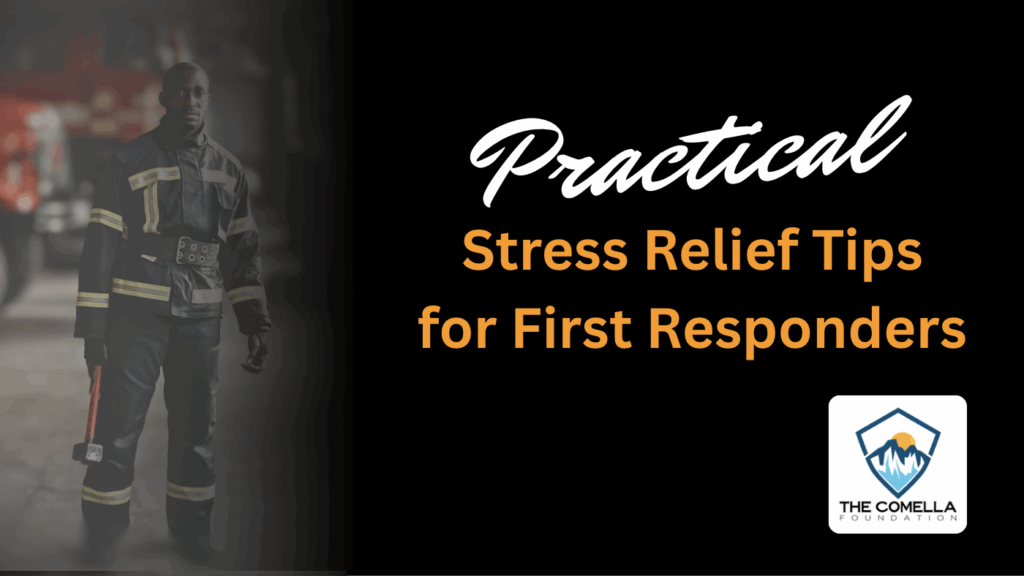First responders—police officers, firefighters, EMTs, and paramedics—carry a heavy burden. Long hours, unpredictable shifts, exposure to trauma, and life-or-death decision-making take a toll on both body and mind. Without effective tools to manage stress, many first responders face burnout, health issues, and strained relationships.
The good news is that simple, practical techniques can help reduce stress and build resilience. In this article, we’ll share proven stress relief strategies that first responders can integrate into their daily routines.
Here’s a Pub Med Study on Stress, Prevention, and Resilience among First Responders to give you an understanding of the crisis we are all dealing with…

1. #1 Practical Stress Relief Tip: Become Aware of Your Breath
Breath is one of these most important tools to control stress in the body. Most of us many times throughout the day will unconsciously or subconsciously hold our breath. This begins to increase tension and stress on our heart and in our bodies on a very subtle level even when the body is not under excess stress like responding to a 911 call.
By beginning to work with and become aware of the breath when the stress level is low pays dividends down the road the next time your on a call.
Tip: Notice your breath the next time you sit down or stand up from a chair
2. Incorporate Movement and Stretching
First responders often carry heavy gear or sit in vehicles for extended periods. This physical strain can amplify stress. Gentle stretching, walking, or mobility exercises help release built-up tension and prevent injuries.
And this is super valuable, however what is going to take reducing physical strain to the next level is incorporating the gentle stretching, walking or mobility exercises with the awareness of your breath.
Tip: Take short “movement breaks” every shift—even two minutes of stretching improves circulation and mental clarity. Remember to pay attention to your breath!
3. Build Strong Peer Support and Make it a Game
Stress can feel isolating, but first responders thrive in teams. Sharing experiences with trusted peers reduces the emotional load and fosters resilience. The emotional load is further exacerbated when you hold your breath. The quick and easy way to reverse that process is paying attention to your colleague’s breath and make it a game. Call each other out in a light hearted way every time you catch them holding their breath.
Tip: Share this article with your colleagues and make it a game pointing out when you catch each other not breathing.
4. Practice Grounding Techniques
Grounding helps first responders return to the present moment after a stressful event. Techniques like feeling your feet on the floor, clenching and releasing fists, or focusing on sensory details (what you see, hear, smell) reset the body’s stress response. This is all awesome! Now add awareness of breath into the equation and grounding will happen much easier and quicker allowing your body to relax faster after a stressful event.
Tip: Use grounding and breath awareness before heading home to avoid carrying stress into family life.
5. Create a Healthy Sleep Routine
Sleep is critical for recovery, but irregular shifts disrupt rest. Prioritize sleep hygiene: darken your room even during the day, avoid caffeine late in the day, and use white noise if needed. Use pillows underneath your knees to take the tension out of your lower back to accelerate this process of falling asleep. Adjust the height of the pillows to the degree that the legs feel “weightless.”
Tip: Even a 20-minute power nap can significantly reduce stress and improve decision-making.
6. Leverage Professional Resources
Many departments now offer peer support programs, counseling services, or resilience training. Taking advantage of these resources strengthens long-term well-being and reduces burnout. Adopting a proactive approach to heath is key. Too many first responders hold it in and project a stoic demeanor concerned about the social stigma of asking for help until it they break.
Tip: Don’t wait until stress becomes overwhelming—use resources early and often.
Conclusion
Stress is an unavoidable part of being a first responder, but burnout doesn’t have to be. By practicing breath awareness, incorporating movement with breath, building peer support, and maintaining healthy habits, first responders can reduce stress, sharpen focus, and stay resilient in demanding careers.
At The Comella Foundation, we specialize in helping first responders relieve stress naturally through Operation: Stress Shield, a program designed with movement, breathing, and relaxation techniques tailored for high-pressure jobs.
👉 Call to Action:
If you’re a department head or a first responder seeking personal support, schedule a FREE 20-minute Discovery Call today to see how Operation: Stress Shield can help your team or you individually.
